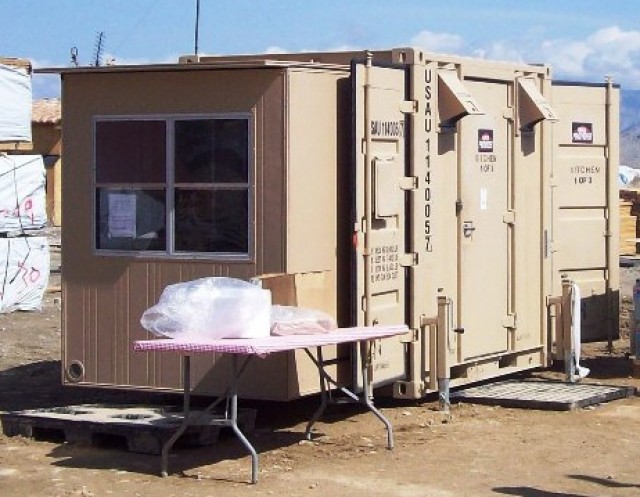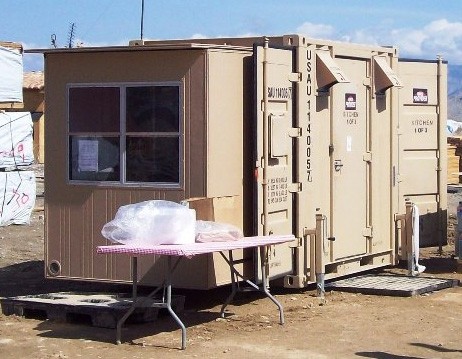NATICK, Mass. (Sept. 11, 2009) -- Soldiers deployed to remote locations in Iraq and Afghanistan have recently been using charcoal and wooden pallets to create a "grill" to cook meals. However, the Expeditionary TRICON Kitchen System is changing that.
The ETKS is a TRICON-container-based all-electric kitchen that can feed 150-300 Soldiers three meals a day, and is easily set up by two Soldiers in about 30 minutes without any material handling equipment.
When an expeditionary force provider system, the Army's premiere base camp system, was being set up in theater, general officers and cooks looked at the kitchen that is part of the FP and said something like that is exactly what they need. Therefore, an Operational Needs Statement (ONS) was created for this type of kitchen. The ONS validated a need for 88 kitchens.
So, personnel from the Product Manager Force Sustainment System's Force Provider team proposed the ETKS.
The team identified and integrated commercial off-the-shelf food service items and military equipment to meet the needs stated in the ONS. Within the kitchens, cooks would need to be able to prepare and serve group rations and although the original requirement was for the kitchens to feed 150 Soldiers three times a day, the ETKS can feed up to 300 personnel three times a day.
The kitchens also needed to be able to operate in climatic extremes and be easily maintainable.
"We had an aggressive schedule to produce and manufacture the kitchens," said Michael Hope, team leader of the Combat Field Services Equipment Team. "Within five months, not only were all 88 kitchens delivered, but they also achieved helicopter sling-load certification."
Mario Lucciarini, ETKS project officer, said, "It was a phenomenal effort from everyone on the force provider team to the integrators to contracting. It was a great team effort."
Hope said the initial feedback was that the cooks and personnel loved the new kitchen system. Comments included it was "right on the money."
During an evaluation with cooks in Afghanistan, the cooks themselves suggested some modifications. After review, the team agreed they could and should be incorporated. Some of the changes included: changing to a convection oven; adding a weapons storage capability; including black-out curtains; and adding more storage spaces.
Hope said the ETKS has been a success. The Soldiers are able to have a self-contained, completely integrated kitchen. It packs small and even includes complete sanitation, he continued.


Social Sharing